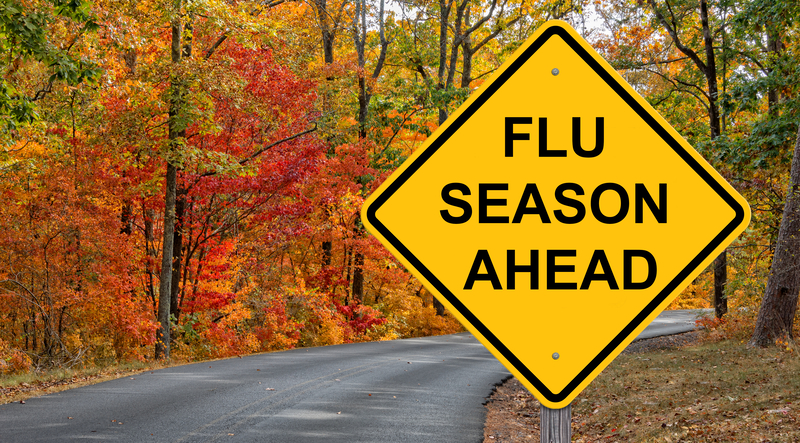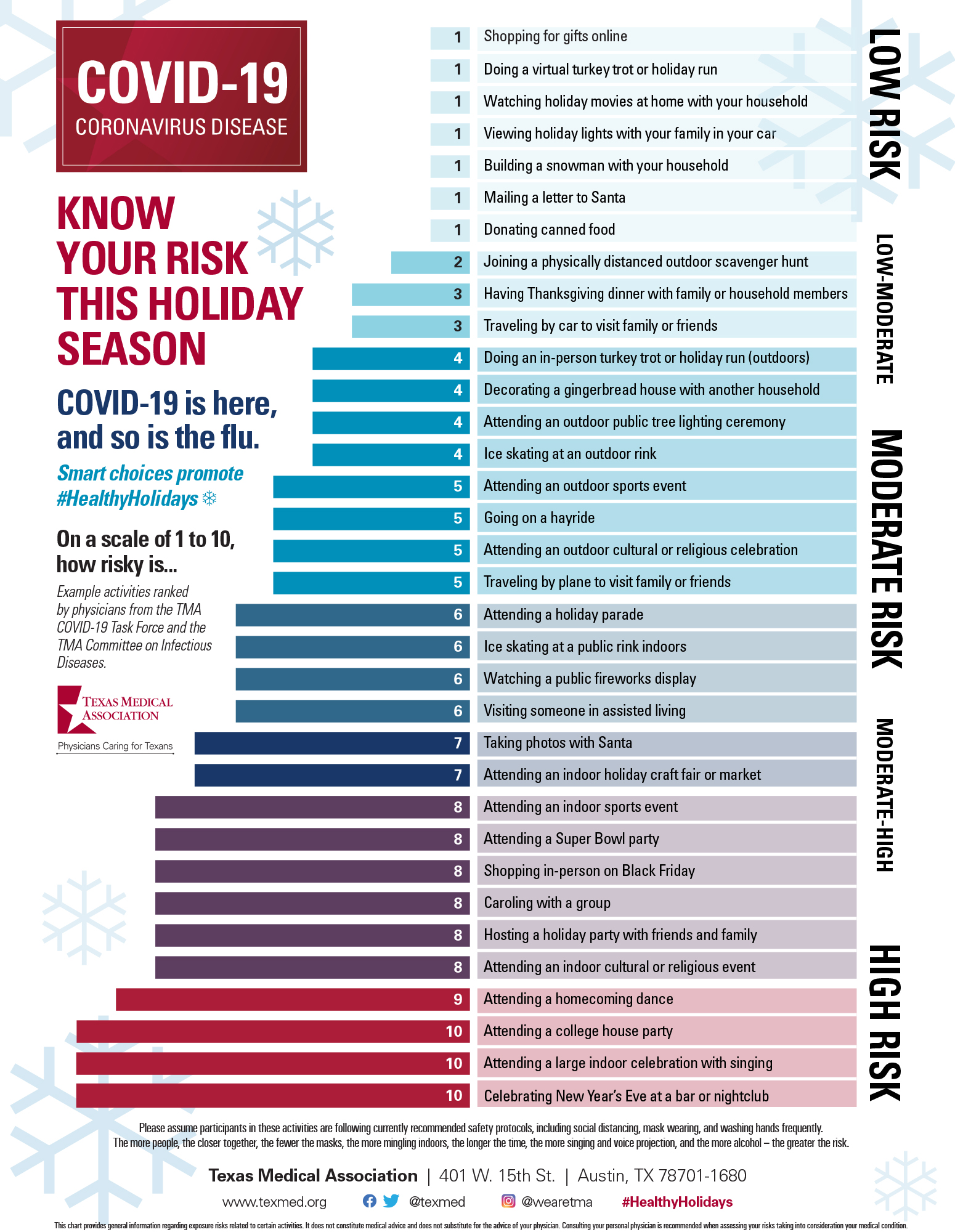Tag: Pandemic
What’s New for Flu?
September 30, 2021

During flu season last year, a record-low number of flu cases was linked to face mask wearing, remote work and school attendance, and physical distancing. But this year, experts fear that the reopening of schools, decreased adherence to pandemic precautions, and surging breakouts and Delta variant infections could result in a serious flu and COVID-19-season.
Take note of differences for 2021-2022 flu season
The Centers for Disease Control and Infection (CDC) pinpoints a few things that are different for the 2021-2022 influenza (flu) season including:
- The composition of flu vaccines has been updated.
- All flu vaccines will be quadrivalent (four component), meaning designed to protect against four different flu viruses. For more information: Quadrivalent Influenza Vaccine | CDC.
- Licensure on one flu vaccine has changed. Flucelvax Quadrivalent is now approved for people 2 years and older.
- Flu vaccines and COVID-19 vaccines can be given at the same time.
- Guidance concerning contraindications and precautions for the use of two flu vaccines – Flucevax Quadrivalent and Flublok Quadrivalent – were updated.
Take time now to get a flu vaccine
You can get your flu vaccine as you normally do, whether that’s through your health care provider or your local pharmacist. CDC has been working with health care providers and state and local health departments on how to vaccinate people against flu without increasing their risk of exposure to respiratory viruses, like the virus that causes COVID-19, and has released Interim Guidance for Immunization Services During the COVID-19 Pandemic.
- CDC recommends a yearly flu vaccine as the first and most important step in protecting against flu viruses.
- Flu vaccines help to reduce the burden of flu illnesses, hospitalizations, and deaths on the health care system each year.
- This season, all flu vaccines will be designed to protect against the four flu viruses that research indicates will be most common.
- Everyone 6 months and older should get an annual flu vaccine, ideally by the end of October.
- Vaccination of people at higher risk of developing serious flu complications is especially important to decrease their risk of severe flu illness.
- People at higher risk of serious flu complications include young children, pregnant women, people with certain chronic health conditions like asthma, diabetes or heart and lung disease, and people 65 years and older.
- Vaccination also is important for health care workers, and other people who live with or care for people at higher risk to keep from spreading flu to them. This is especially true for people who work in long-term care facilities, which are home to many of the people most vulnerable to flu.
- Children younger than 6 months are at higher risk of serious flu illness but are too young to be vaccinated. People who care for infants should be vaccinated instead.
Take preventive actions to reduce the spread of flu
- Avoid
close contact with people who are sick.
- If you are sick, limit contact with others as much as possible to keep from infecting them.
- Cover
coughs and sneezes.
- Cover your nose and mouth with a tissue when you cough or sneeze. Throw the tissue in the trash after you use it.
- Wash your hands often with soap and water. If soap and water are not available, use an alcohol-based hand rub.
- Avoid touching your eyes, nose, and mouth to prevent the spread of germs.
- Clean and disinfect surfaces and objects that may be contaminated with viruses that cause flu.
- For flu, CDC recommends that people stay home for at least 24 hours after their fever is gone except to get medical care or other necessities. Fever should be gone without the need to use a fever-reducing medicine. Note that the stay-at-home guidance for COVID-19 may be different. Learn about some of the similarities and differences between flu and COVID-19.
- In the context of the COVID-19 pandemic, local governments, or public health departments may recommend additional precautions that you should follow in your community.
Take antiviral drugs if prescribed
- If you are sick with flu, antiviral drugs can be used to treat your illness.
- Antiviral drugs are different from antibiotics. They are prescription medicines and are not available over-the-counter.
- Antiviral drugs can make flu illness milder and shorten the time you are sick. They may also prevent serious flu complications.
- Studies show that flu antiviral drugs work best for treatment when they are started within 2 days of getting sick, but starting them later can still be helpful, especially if the sick person has a higher risk factor or is very sick from flu.
- If you are at higher risk from flu and get flu symptoms, call your health care provider early so you can be treated with flu antivirals if needed. Follow your doctor’s instructions for taking this drug.
Flu symptoms include fever, cough, sore throat, runny or stuffy nose, body aches, headache, chills, and fatigue. Some people also may have vomiting and diarrhea. People may be infected with flu and have respiratory symptoms without a fever. Visit CDC’s website to find out what to do if you get sick with flu. Learn about some of the similarities and differences between flu and COVID-19, and the difference between flu and the common cold.
InsureYouKnow.org
After you have gotten your vaccine for the 2021-2022 flu season, keep a record of the date of and description of your injection at insureyouknow.org. On this secure website, you also can keep copies of your insurance cards and driver’s license that could be helpful when you fill out medical forms at your doctor’s office or neighborhood pharmacy.
Home for the Holidays
December 17, 2020

As 2020 comes to a close, memories of past holiday gatherings with family and friends may increase the stressful and isolating feelings you have experienced during the COVID-19 pandemic. Holiday celebrations will be different this year to prevent the spread of COVID-19.
Texas Medical Association has compiled a Know Your Risk This Holiday Season chart to provide a list of high-risk activities to avoid and fun alternatives to adapt that pose lower risk of spreading COVID-19. The chart ranks 34 holiday activities from least to most risky so holiday revelers can make informed choices during the busiest travel and social-gathering season of the year. Among the least risky items on the chart are shopping for gifts online, watching holiday movies at home, or viewing holiday lights with your family in your car. The riskiest activities include attending a large indoor celebration with singing, attending a college house party, and celebrating New Year’s Eve at a bar or nightclub.
The Centers for Disease Control and Prevention (CDC) reports that the best way to stay safe and protect others this holiday season is to stay home and celebrate with people with whom you live. Getting together with family and friends who do not live with you can increase the chances of getting or spreading COVID-19 or the flu.
Travel Plans up in the Air
Travel is highly discouraged because it may increase your chance of getting and spreading COVID-19. Consider postponing travel and staying home to protect yourself and others this year.
If you are considering traveling, the CDC recommends asking yourself the following questions before you make your travel plans.
- Are you, someone in your household, or someone you will be visiting at increased risk for getting very sick from COVID-19?
- Are cases high or increasing in your community or your destination? Check CDC’s COVID Data Tracker for the latest number of cases.
- Are hospitals in your community or your destination overwhelmed with patients who have COVID-19? To find out, check state and local public health department websites.
- Does your home or destination have requirements or restrictions for travelers? Check state and local requirements before you travel.
- During the 14 days before your travel, have you or those you are visiting had close contact with people they don’t live with?
- Do your plans include traveling by bus, train, or air which might make staying 6 feet apart difficult?
- Are you traveling with people who don’t live with you?
If the answer to any of these questions is “yes,” you should consider making other plans, such as hosting a virtual gathering or delaying your travel.
The safest thing to do is to stay home, but if you do decide to travel, testing can make travel safer but it does not eliminate all risk.
Safety Measures from Home and Back
If you decide to travel, get a flu vaccine prior to traveling and follow these safety measures during your trip to protect yourself and others from COVID-19:
- Wear a mask in public settings—on public and mass transportation, at events and gatherings, and anywhere you will be around people outside of your household.
- Avoid close contact by staying at least 6 feet apart from anyone who is not from your household.
- Wash your hands often with soap and water for at least 20 seconds or use hand sanitizer that contains at least 60 percent alcohol.
- Avoid contact with anyone who is sick.
- Avoid touching your face mask, eyes, nose, and mouth.
According to the CDC, for those who decide to travel, COVID-19 tests should be considered one to three days before the trip and again three to five days afterward. The agency also recommends travelers reduce non-essential activities for a full week after they return or for 10 days if not tested afterward.
Based on extensive modeling, the CDC has revised quarantine guidance and now recommends that people who have been in contact with someone infected with the virus can resume normal activity after 10 days, or seven days if they receive a negative test result. That’s down from the 14-day period recommended since the pandemic began.
At InsureYouKnow.org, you can keep track of travel insurance, medical records, including any COVID-19 testing and results as well as vaccines for the flu and COVID-19, when it becomes available. Social gatherings next winter are predicted to be more enjoyable and fraught with less fear of contracting and spreading a coronavirus. You’ll also have more opportunities to travel and to reconnect with family and friends after a COVID-19 vaccine has been disseminated worldwide.
